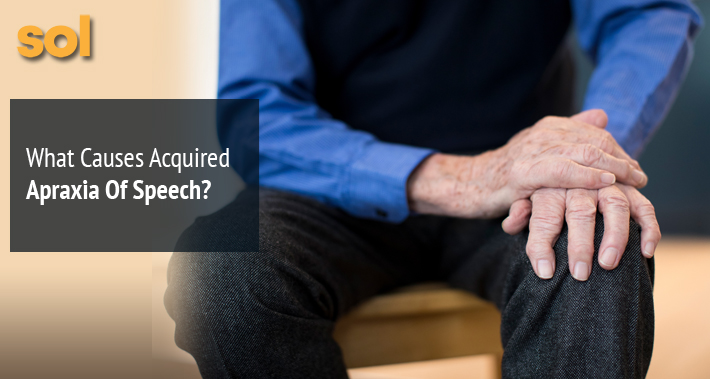
Here at Sol, we offer speech therapy in Austin Tx.
And on this speech and language therapy blog, we’ve covered a variety of different topics.
In particular, childhood apraxia of speech we’ve looked at, a speech sound disorder whose cause is usually unknown.
Acquired apraxia of speech, on the other hand, is a different story.
There are many different possible causes for acquired apraxia of speech, but they all relate to the same thing – damage to the part of your brain that controls speaking.
Below, we’ll take a closer look at the various different possible causes of acquired apraxia of speech.
If you or a loved one is dealing with this disorder, however, you’re not alone.
Here at Sol Speech And Language Therapy, we offer speech therapy for adults that can help.
But for now, let’s take a look at the potential causes of acquired apraxia of speech.
Neurological Damage
The most common cause of acquired apraxia of speech is neurological damage.
There are multiple parts of your brain that control speech, including your cerebrum, cerebellum, motor cortex, Broca’s area, and Wernicke’s area.
Damage to any of these areas can affect your brain’s ability to formulate language, or to communicate with the muscles responsible for speech.
What causes this type of neurological damage?
Let’s take a look.
1.Stroke
A stroke can happen in one of two different ways.
In the first way, the artery bringing blood to your brain becomes blocked.
In the other, a blood vessel in your brain bursts.
Both types of strokes have the same effect – part of your brain is either damaged, or dies altogether.
If this damage occurs in one of the parts of your brain controlling speech, it can cause acquired apraxia of speech.
In fact, a significant number of acquired apraxia of speech cases are the result of a stroke.
As a result, speech therapy for stroke recovery often includes addressing acquired apraxia of speech.
2. Traumatic Brain Injuries
Traumatic brain injuries can happen in so many different ways.
Slips, falls, car accidents, sports injuries, assaults, the list goes on.
Because of the chaotic nature of a traumatic brain injury, it affects everybody differently.
For some, there may be little to no impact on speech or language abilities, depending on what area is affected.
For others, it can trigger things like aphasia, a disorder that causes difficulty with expressive and receptive language skills.
It can also trigger dysarthria, a speech sound disorder affecting your oral muscles.
And of course, it can cause acquired apraxia of speech.
Progressive Neurological Conditions
Each of the issues we talked about above are sudden events.
But while quick, immediate trauma can trigger acquired apraxia of speech, it can also develop slowly.
In particular, it can develop in the context of progressive neurological conditions.
Diseases that gradually impact the brain, such as Parkinson’s disease, Alzheimer’s disease, and certain types of dementia, can eventually manifest as acquired apraxia of speech.
1. Parkinson’s Disease
Parkinson’s disease is a progressive disorder, meaning it’s a disorder that tends to get worse over time.
In the case of Parkinson’s disease, it affects a part of your brain called the basal ganglia.
This is one of the places where your body produces dopamine.
You might think of dopamine as the “happy chemical” in your brain, and that’s why one of the symptoms of Parkinson’s disease is depression.
However, it also plays a role in motor control.
Without dopamine, your brain has a more difficult time controlling your muscles, including those related to speech.
Acquired apraxia of speech may emerge as a secondary symptom, as the brain struggles to coordinate the precise muscle movements necessary for articulate speech.
2 Alzheimer’s Disease
In Alzheimer’s disease, which primarily affects memory and cognitive function, language centers of the brain may also be compromised over time.
Acquired apraxia of speech can be a result of the overall cognitive decline and the impact on the neural pathways responsible for speech planning and execution.

3. Brain Tumors
The presence of brain tumors can lead to acquired apraxia of speech.
This happens by physically intruding on or compressing the regions responsible for speech production.
Tumors can disrupt the normal functioning of the motor cortex or impede the communication pathways between different areas involved in speech.
Infections and Inflammatory Conditions
Certain infections and inflammatory conditions affecting the brain can trigger acquired apraxia of speech.
Encephalitis, for example, an inflammation of the brain usually caused by viral infections, can lead to neurological damage.
This can impact the areas crucial for speech motor control.
Neurodegenerative Disorders
Apart from conditions like Alzheimer’s disease, other neurodegenerative disorders can contribute to acquired apraxia of speech.
This includes amyotrophic lateral sclerosis (ALS), or Lou Gehrig’s disease.
It was named that after the famous baseball player Lou Gehrig acquired this disorder.
However, modern readers may be more familiar with Stephen Hawking, who also had this disorder.
As these disorders progress, the degeneration of motor neurons can extend to the speech related areas, leading to challenges in planning and executing speech movements.
Vascular Disorders
Beyond strokes, other vascular disorders that compromise blood flow to the brain can contribute to acquired apraxia of speech.
Conditions like arteriovenous malformations or vasculitis can disrupt the intricate balance required for optimal brain function, impacting speech coordination.
Can Environmental Toxins and Substance Abuse Cause Acquired Apraxia Of Speech?
In some cases, exposure to environmental toxins or substance abuse can be linked to acquired apraxia of speech.
Chronic exposure to certain chemicals or the neurotoxic effects of substance abuse can contribute to damage in the neural pathways associated with speech production.
This has been liked to acquired apraxia of speech, as well as aphasia, dysarthria, and stuttering.
RELATED: Speech Therapy for Stuttering Disorder
As well, if you’re taking drugs while pregnant, it may cause speech disorders in your baby once they’re born.
Changes Related To Aging
Aging itself is not a cause of acquired apraxia of speech.
However, the likelihood of developing neurological conditions associated with this disorder increases with age.
Age related changes in the brain, combined with other risk factors, can create a conducive environment for acquired apraxia of speech to emerge.
How Can Speech Therapy Help With Acquired Apraxia OF Speech?
Acquired apraxia of speech is a complex and multifaceted disorder with a range of potential causes.
From sudden neurological events like strokes and traumatic injuries to the gradual progression of neurodegenerative conditions, the onset of acquired apraxia of speech is influenced by a variety of factors.
However, you don’t have to go through this alone.
Speech therapy for acquired apraxia of speech can help you or your loved one regain some or all of your communication abilities.
Book Your Appointment With Sol Speech And Language Therapy Today
At Sol Speech And Language Therapy, our speech pathologists are trained to recognize and treat acquired apraxia of speech in adults.
To find out more about how speech therapy services can help, begin with a consultation at one of our Texas locations.
Book your appointment with Sol Speech And Language Therapy today.
6448 E Hwy 290 Suite E-108,
Austin, TX 78723
(512) 368-9488
» https://g.page/r/CfRfhOpEQm7BEAE
Sol Speech & Language Therapy
555 Round Rock W Dr E-221,
Round Rock, TX 78681
(512) 808-3953
» https://g.page/r/Cb5pwCTosSEfEBM
Sol Speech & Language Therapy offers personalized skilled intervention to those struggling with their speech and language skills. Services offered include screening, consultation, and comprehensive evaluation. We also provide one-on-one and/or group therapy for speech sound disorders, receptive/expressive language delay/disorder, stuttering/cluttering, accent reduction, and much more.